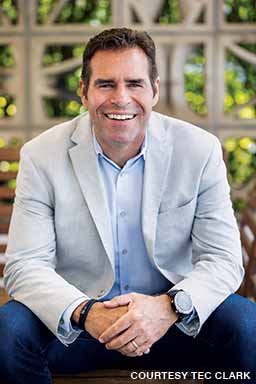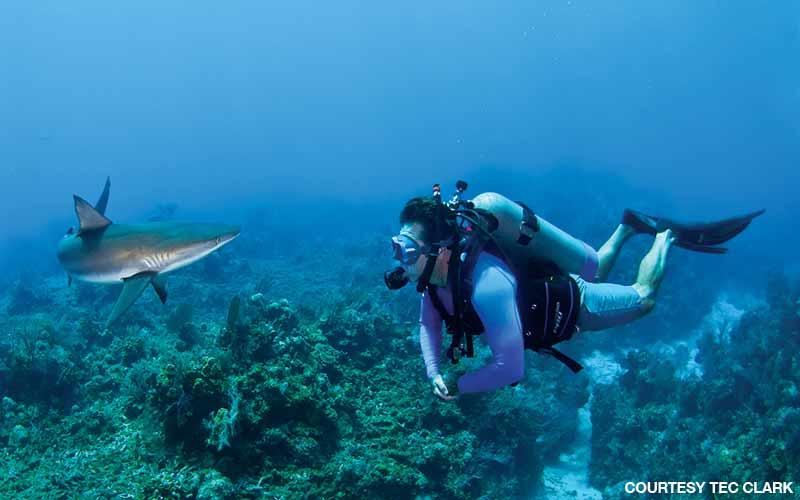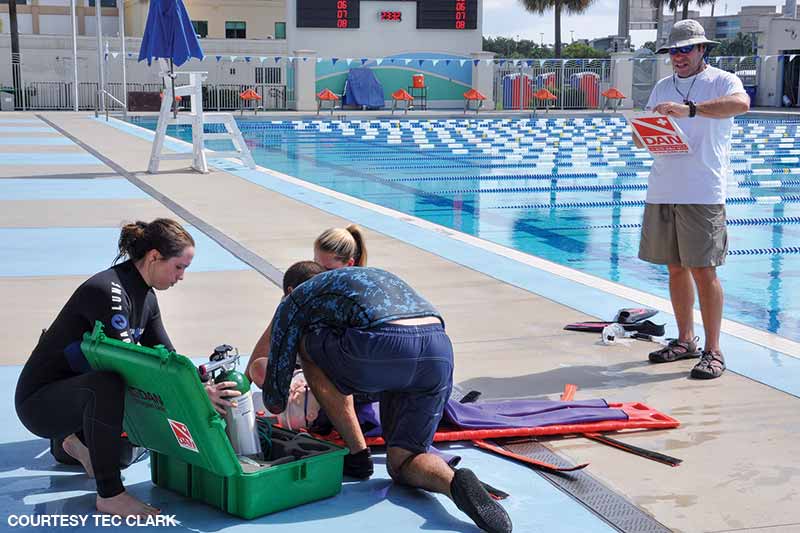Going beyond the standard

Hometown: Fort Lauderdale, Florida
Years Diving: 39 years
Favorite Dive Destination: Turks and Caicos
Why I’m a DAN® Member: As a dive professional who specializes in training, education, safety and risk management, DAN’s core values resonate with me. I’ve supported DAN ever since I became a pro and learned about how DAN serves the dive community, and I continue to be an ambassador to this day.
Dive legend Tec Clark has built a memorable career and legacy around training excellent divers. He describes his underwater experiences as “absolutely worshipful” and “otherworldly.” It’s the place where he feels closer to God than anywhere else on Earth. Helping others safely and professionally experience this same life-changing magic is his focus.
Clark seemed destined for a life revolving around water and teaching. As a child, he stared off his grandfather’s fishing boat into the deep, wishing he could be down with the fish. At 12 years old, he went on his first dive and instinctively resecured his instructor’s loose tank. He was certified at age 14 and an instructor by age 20.
As a young instructor, he progressed quickly to become the managing director of the University of Florida Academic Diving Program, one of the nation’s largest university dive training programs. Clark honed his skills and philosophy on safety while teaching to auditoriums of over 200 students and certifying hundreds of divers each year. He is now the associate director for Aquatics and Scuba Diving at Nova Southeastern University in Fort Lauderdale, Florida, where he directs the academic diving program.

Through these leadership roles and as national director of the YMCA Scuba Program and captain of the first U.S. Freediving Team, Clark emphasized strong skills, proper education and safety. Now, as the founder of ScubaGuru.com and the host of several dive-themed podcasts, he shares his knowledge to benefit all divers.
“Scuba education is foundational, and continuing skill set development allows for proficiency and enjoyment,” Clark said. “When I see things such as ‘three-day scuba classes,’ it doesn’t compute well with me because I’ve seen the product of three-day scuba classes: divers who are uncomfortable and don’t have longevity in the sport.”

Proper training, mentorship and many contact hours with students in the water are the keys to instilling values and creating better ambassadors for the sport, Clark said. Nobody is born a great diver; mentorship makes them into one, he added. This approach is where his teaching philosophy shines.

“The thing that most people will remember me for is how I approach teaching and supervising,” he said. “I open their eyes to a different way of looking at dive education and risk management.”
Clark practices and teaches a three-pronged approach: Understand everything that can go wrong on a dive, look at how to mitigate every risk, and be prepared with a response if a problem arises.
“My dive professionals throughout the years have learned this approach to risk management for every dive they do,” he explained. “Once you do, it will change the way you teach, supervise and manage risks on every dive. Risk management is an area where the divemasters and instructors I’ve taught are different from most dive pros.”

Clark also provides the rationale behind every educational principle he puts in place so his dive professionals understand why they do things a certain way. Mask clearing, for example, is a fundamental skill. The typical industry method calls for divers to perform the skill a certain number of times up to a certain standard, and then they are considered to know how to clear their masks. Clark instructs divers and trains dive professionals to teach one-handed and sideways mask clears in addition to the traditional two-handed clear. He wants to instill true mastery of the skill, which he defines as “absolute comfort” in its performance.
“The only way to achieve absolute comfort is to do skill variations and repeats with changing dynamics,” he said. “When I teach mask clearing, it isn’t good enough to do just the prescribed amount. I teach other situations such as one-handed, neutrally buoyant and to the side. If a student has only done it with two hands but now has to hold on to a line in real life, they’ll drift away.”
Looking back at his life’s work and knowledge, Clark considered the unique skill set he had developed and how to share his tips with others. That thought led to the founding of ScubaGuru.com, a website dedicated to helping people become better dive professionals, which leads to better divers.

ScubaGuru gathers into one place all the tips and techniques that Clark and other dive industry leaders have learned from their experiences and incorporated into their teachings so divers of any level can enhance their skills. Dive professionals have a duty of care for people in their charge that requires them to stay informed about the best safety and teaching practices, Clark said. The site includes PDF resource manuals, podcasts with founding members of the industry, and the ScubaGuru Academy with online courses addressing things that training agencies may not.
ScubaGuru’s motto, “Go beyond the standard,” grew from the idea that stronger, more confident divers benefit from going beyond agency standards in their training. The platform’s goal is to promote excellence in professional dive services to prevent divers from leaving the sport or experiencing injuries and fatalities.
“ScubaGuru is a brand that celebrates what it means to be at a high level of diving,” Clark said. This professionalism and excellence minimize risk and allow people to flourish in diving and develop a love for the sport that will last their entire lives.
Clark summed up the philosophy behind all his advice to new dive professionals: “Great training is the key to great diving. Don’t cut corners. Offer excellent training. Go beyond the standard.”
Explore More
Learn more from Tec Clark in these videos.
© Alert Diver — Q2 2021